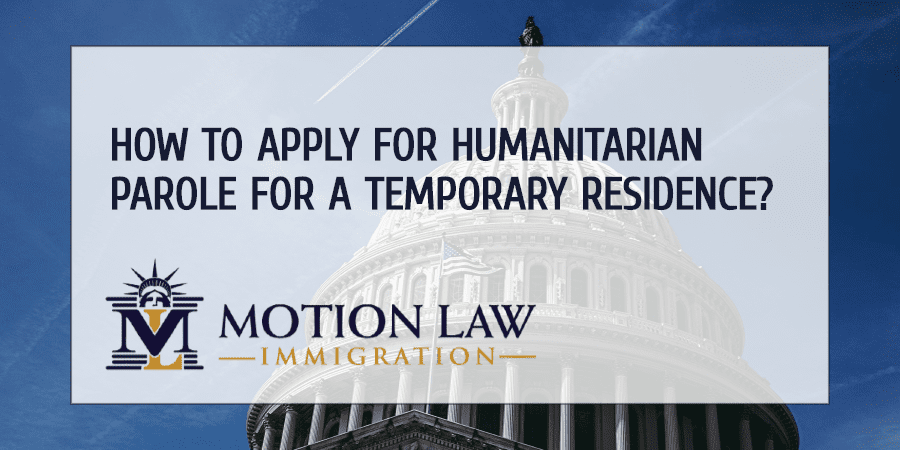How to Apply for Humanitarian Parole for a Temporary Residence?

Request a Humanitarian Parole to go to the US
There are many different ways to gain legal entry to the US either on a temporary or permanent basis. Most immigrants apply to have a visa which gives them permission to stay in the country, however, when a visa cannot be obtained for whatever reason, there in an opportunity, where applicable, to apply for a temporary residence permit called Humanitarian Parole.
When it is required to emigrate to the US due to humanitarian emergency or significant public benefit, someone outside the US can apply for Humanitarian Parole. This permission can be requested personally, by another person (on behalf of someone) or by a NGO.
The applicant or sponsors must have the necessary financial resources to prove that the applicant will be a public benefit to the US.
According to the USCIS, one in four requests for humanitarian parole is denied, and if approved, the residence permit is for a specific time.
What are the Requirements to Request a Humanitarian Parole?
- The applicant must be outside the US.
- The applicant cannot apply for a visa because he/she does not qualify for any of them.
- The entry to the US must be temporary.
- The reason why the parole is requested must be humanitarian or for public benefit.
What is a Humanitarian Reason or Public Benefit?
Under US immigration laws, a humanitarian parole can be requested when:
- The applicant must visit a sick or injured relative.
- To receive medical treatment that is only performed in the US or is not available in the birth country nor in a nearby country.
- To appear as a witness in a civil or criminal trial.
- For exceptional cases of family reunification, divorces or in cases of physical or mental disability.
- When it implies an important public benefit (investments, work, research).
Who can Submit the Request for Humanitarian Parole?
- The person who needs the parole.
- A lawyer.
- A nonprofit organization.
- A family member or other person who is in the United States and can prove legal immigration status, such as an American passport or Green Card.
How to Request the Humanitarian Parole?
To make the request for humanitarian parole it is required to complete two official forms, pay and attach additional documentation that supports the request.
If the applicant, who is outside the US, submits the application himself, he must go personally to the local embassy or consulate and request a pre-authorization to complete Form I-131.
The other form that must be submitted with the application is I-134, which is an affidavit on economic resources; it includes tax return, proof of current employment and if the parole is requested for medical reasons, proof of how the treatment will be paid.
If a lawyer makes the request for this permit, the G-28 form must be submitted.
If the request is sent by a sponsor who is in the US, the only difference is that it is not necessary to go to the consulate for a pre-authorization. The sponsor needs to file Forms I-131 and I-134. It is a requirement to attach the payment and relevant additional documentation.
USCIS Response to the Request for Humanitarian Parole
As a general rule, the Immigration and Citizenship Service (USCIS) responds by letter to the applicant and his lawyer (if applicable) between 90 and 120 days.
If the request for the humanitarian conflict is denied, it cannot be appealed, but if more documents are obtained to support the request, a new application can be done.
If approved, the applicant and his lawyer are notified (if applicable). Then, the embassy or consulate coordinates with the applicant to give him the documents to travel to the US for the time granted.
You can ask for a new humanitarian parole once you are in the United States. It is not an extension, but a new application.
If you have any questions about an immigration issue or relating to a case you may have currently in Progress, then please don’t hesitate to contact us for a FREE Consultation with one of our expert immigration attorneys. Alternatively, simply call Motion Law today at: (202) 918-1799